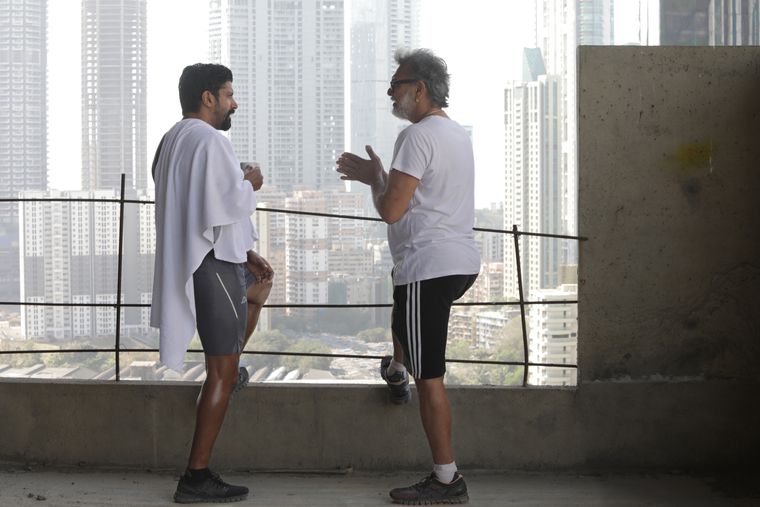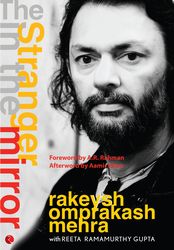More than a story of triumph, Rakeysh Omprakash Mehra’s new book, The Stranger in the Mirror, is a story of struggle. Whether it was drowning himself in alcohol after the failure of Delhi-6 (2009) at the box office; mortgaging his house—funded by his savings from 20 years of ad-filmmaking—to make Rang De Basanti (2006); or shooting the film despite a massive bout of jaundice (he told no one and wore dark glasses to hide his yellow eyes), Mehra has known first-hand the sweat and grit it takes to make movies in India when you are a penniless outsider. He has had a choppy career graph, with his first film, Aks (2001), not doing well at the box office, followed by the tremendous success of Rang De Basanti, the disappointment of Delhi-6, and the astronomic heights Bhaag Milkha Bhaag (2013) touched. Every disappointment is written with heart-breaking honesty and every success with disarming humility.
The story begins with a Philips mono-record player that the Maharaja of Bharatpur won in a raffle at Delhi’s Claridges Hotel and donated to Mehra’s father, who had worked his way up from a dish washer to a food and beverage manager at the hotel. The Mehras were then living in the staff quarters of the hotel and had no access to a TV. Mehra found a man selling old records at Chor Bazaar, and pestered his mother to buy him a four-disc, eight-sided record of the complete soundtrack of Mughal-e-Azam for the princely sum of 010. Some might say the record sealed his destiny as a filmmaker.
“Mughal-e-Azam fired up my imagination; I could hear the dialogues verbatim in my head and imagine any scene I wanted, in whatever way I chose, to complete my visual experience,” writes Mehra. “The freedom to imagine was bolstered by the fact that I had never seen the film. Needle on record, night after night, falling asleep to the dialogues; I memorised every dialogue, every sound, every song. The roar of ‘Mera jism zaroor zakhmi hai, lekin meri himmat zakhmi nahi’ and the intense pathos of ‘Meri aankhon se mere khwab na cheeniye, Shehzaade, main marr jaoongi’ would reverberate in my ears and my heart for years to come.”
In a way, his book, co-written with Reeta Ramamurthy Gupta, is much like his cinema—there is an honesty to it, but there is also showmanship, a staying true to yourself while catering to the fancies of the audience. “I wanted my expression to be not literally but emotionally correct,” he tells THE WEEK. “Literally, I didn’t care. You can only do what you know. You cannot pretend to look at a dictionary and look up words to impress others. The only thing I knew, as an extension of my filmmaking, was to tell my story as honestly and transparently as possible.” The book is strewn with illustrations, poetry and celebrity takes. Everyone from Sonam Kapoor and A.R. Rahman to Aamir Khan and Amitabh Bachchan has written about their experience working with Mehra.
But why write a memoir now, when he is still in the prime of his life? “I wanted to write it before I get too old and start forgetting things,” he quips, before adding on a more serious note, “It started with the journey of my films. Then organically, it grew into an autobiography. As conversations grew, I realised that it is very difficult for me to separate my films from my life. What I do is who I am. Forget about films, even if I was selling tea in a corner stall, it would be what I am. I am not special just because I make movies. I would be living in la la land if I thought that.”
The Stranger in the Mirror does justice to its purpose—the making of each movie is described in painstaking detail. The only one that does not fall within its ambit is Toofan, Mehra’s latest—starring Farhan Akhtar, Paresh Rawal and Mrunal Thakur—which was still being made when the book was completed. “When I heard a 20-minute narration of Toofan, I told Farhan that we should make this film,” says Mehra. “It has got a voice and a lovely message. It is trying to say something.” About the film getting mixed reviews, Mehra says, “Once I have done a film, it does not belong to me anymore. It belongs to the audience and it is up to them to like or dislike it. Whether they give it five stars or one star, I respect everything they say.”
Despite the mixed reviews for Toofan, there is no denying that Mehra is a master at his craft. He was one of the first to blur the line between popular and art-house cinema. As actor R. Madhavan (whom Mehra directed in Rang De Basanti) says, “There is a kind of cinema that’s relevant to one generation. Then there’s a kind of cinema that is timeless. Those directors who make cinema on the basis of ‘what’s working’ at that point in time become obsolete over time. But the visionary directors create timeless cinema. RDB went on to make an entire generation of directors obsolete in 2006. The new-age directors did not need item numbers or six packs. They had powerful stories to tell that changed mindsets and redefined social impact. Rakeysh is and will always remain one of these ‘originals’.”
But the desire to be an ‘original’, says Mehra, cannot be an end in itself. “You make films about what you feel deeply,” he says. “You tell that story and then you tell it in a way that feels right. That is about it. I try and keep it simple. Cinema is art, no question about that. But if you want to tell your story to a wider base, then it has to be more like pulp art than fine art. I like to tell my stories lyrically. The entire movie is like a symphony playing in my head.”
The Stranger in the Mirror
By Rakeysh Omprakash Mehra with Reeta Ramamurthy Gupta
Published by Rupa Publications
Price Rs390; pages 340




